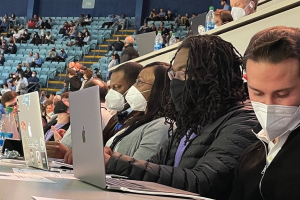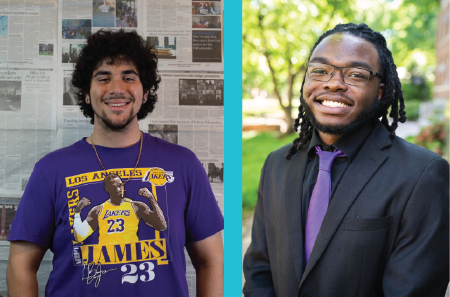Students score with Sports Journalism Institute acceptance

By Beth Hatcher
Sports don’t just happen on the field, they play across the greater cultural landscape, influencing everything from fashion to politics.
And as a microcosm of culture — the good and the bad — the sports industry can produce fault lines for female and minority journalists, who must often overcome barriers to finding work, getting promotions or even being taken seriously.
How do you navigate being the only journalist of color covering a game? How do you fight prejudice that a woman can’t write about sports? How do you build a network of other minority journalists to help you get ahead?
The Sports Journalism Institute program answers those questions and more during a nine-week training and internship program for female and minority college students interested in sports journalism careers — and this spring two UNC Hussman students will be attending.
Jeremiah Holloway ’22 and PJ Morales ’23 will attend the program designed to enhance racial and gender diversity in sports departments nationwide in May.
Pictured above at right, Holloway reporting at a UNC men's basketball home game earlier this year for The Daily Tar Heel.
The first week of the SJI program is a “bootcamp” during which students will hear from newsroom professionals and academics on topics ranging from ethics in the press box, to diversity in the media, to tips on beat coverage. Students also will hear from SJI alumni who have used the program as a launching pad to careers at places such as ESPN, The New York Times, The Washington Post, USA Today and The Athletic.
Students then gain eight weeks of professional experience at a paid internship in the sports department of a newsroom, and a $500 scholarship upon successful completion of the program for students returning to college.
Holloway will intern with the sports department of Kentucky’s Louisville Courier-Journal. Morales will work in the sports department at The Washington Post.
“The court is open for everybody,” said Holloway about what attracted him to sports. Basketball (he likes its speed and its grace) is his favorite game to cover at The Daily Tar Heel, where he serves as assistant sports editor, and one day he hopes to write about the game professionally.
Anybody can pick up a ball and play, Holloway said.
Pictured below, left to right, are Morales and Holloway.

For Parth Upadhyaya ’20, sports were a connection to the culture around him. His parents grew up watching cricket in India, but U.S.-raised Upadhyaya paid more attention to the sports played around him while he grew up in Raleigh, North Carolina — sports like basketball. Upadhyaya now covers sports as a reporter for Pennsylvania’s Beaver County Times.
The biggest lesson he learned at SJI in 2019 — he interned during the program for The Denver Post — was one of connection as well.
“I learned about the importance of being connected, seeking mentorship of other minority journalists and learning from their trials and tribulations,” Upadhyaya said.
SJI board member Gregory Lee said that while sports can be a connector, sports journalism often teems with the same barriers to entry as any other profession. “There are going to be times when alums of our program will be the only minority sitting in the press box,” said Lee, who is a 1994 alumnus of the program. “We teach them how to handle that.”
The program also teaches core journalism skills like meeting deadlines and writing well, all in a supportive, nurturing environment, Lee said.
Beth McNichol ’95 was a peer of Lee’s during SJI’s 1994 session. “I loved SJI. It was world-expanding for me. To go from a kid who waited for her dad’s sports magazines to hit the mailbox each week to a journalism student sitting in a room with — and being taught by — the professionals who graced the pages of some of those very publications was just incredibly cool,” said McNichol, a freelance writer who started her career as a reporter for Sports Illustrated. “I owe an awful lot to the class of students I was in SJI with. We became a family over one summer. To find that kind of camaraderie in any field underrepresented by women and minorities is a gift.”
Lee said the connections SJI students leave with are just as important as the skills they learn.
“We have a family approach at the program. Having a support system in a very competitive environment [like sports journalism] is very important for the success of our students,” said Lee, the senior assistant managing editor of talent and community at Boston Globe Media.
Morales said he’s excited he’ll be in an environment with other minority journalists. “I’m excited to learn from them and learn how they’ve handled different challenges in their careers,” he said. “I want them to tell me ‘This is how you’re going to be judged in interviews differently; This is how you’re going to stand your ground.’”
He’s also excited for a chance to do what he loves, which is creating stories that explore the reach of sports (soccer and basketball are favorites) beyond the arena.
“I really want to write about sports’ impact on culture, such as the platforms athletes have to influence society,” Morales said.
Holloway echoed that sentiment, noting that the everyday parameters of sports writing — like tons of reporters writing about the same games— meant finding compelling stories off the field proved critical to good sports coverage.
Most of the best sports stories weren't even about a game but were personality profiles or trend pieces, Holloway said.
Jay Eubank, Hussman’s director of career services, praised the merits of the SJI program — and its Hussman participants.
“PJ and Jeremiah are just the type of students who journalism, not just sports journalism, needs today. They are bright, curious and I think, most importantly, bring a different lens to reporting and different life experiences,” said Eubank, who works with students applying to SJI. “For too long a lot of sports staffs at newspapers, magazines and broadcast were primarily white and usually male. Our country is much more than that, and sports staffs should reflect that diversity, particularly in light of how important sports are in our culture and, for many, our everyday lives,” Eubank said.
Lee noted one of the main aims of the SJI program is making minority journalists feel that their stories matter.
“Ultimately, we want to teach our students that they belong in this industry as much as anyone else and that they can achieve whatever they want,” Lee said.